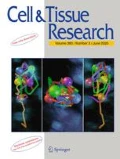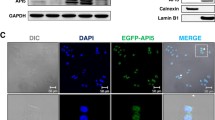Abstract
iASPP (inhibitory member of the ASPP family), the conserved key inhibitor of p53, is overexpressed and plays an important oncogenetic role in many human cancers. However, its function in cervical cancer remains unknown. The objective of this study was to investigate the expression and clinical relevance of iASPP in cervical cancer. The mRNA and protein expression levels of iASPP were determined by real-time quantitative reverse transcription with the polymerase chain reaction and Western blot. Paraffin sections of 149 patients with FIGO Ib1-IIa squamous cell cervical cancer were stained by using immunohistochemistry for iASPP, and its relationship with clinicopathologic parameters and prognosis of cervical cancer patients was analyzed. The mRNA and protein expression levels of iASPP were significantly elevated in cervical cancer tissues. The increased nuclear iASPP expression was correlated strongly with higher FIGO staging, deep cervical stromal invasion, pelvic lymph node metastasis, and poor overall and disease-free survival of patients with cervical cancer (all P<0.05). Multivariate Cox analysis showed that high nuclear iASPP expression was an independent prognostic factor for overall survival. Furthermore, patients with high nuclear iASPP expression were much more resistant to radiation or chemotherapy, resulting in poor overall and disease-free survival than those with low expression after receiving radiation or chemotherapy (all P<0.05) and indicating correlations with chemoresistance and radioresistance. This study thus demonstrates that iASPP is highly elevated in human cervical cancer, and that overexpression of nuclear iASPP is correlated with poor prognosis and chemoresistance/radioresistance, suggesting that iASPP might serve as a novel potential prognostic marker and therapeutic target for cervical cancer.






Similar content being viewed by others
References
Alsafadi S, Tourpin S, André F, Vassal G, Ahomadegbe JC (2009) P53 family: at the crossroads in cancer therapy. Curr Med Chem 16:4328–4344
Bergamaschi D, Samuels Y, O’Neil NJ, Trigiante G, Crook T, Hsieh JK, O’Connor DJ, Zhong S, Campargue I, Tomlinson ML, Kuwabara PE, Lu X (2003) iASPP oncoprotein is a key inhibitor of p53 conserved from worm to human. Nat Genet 33:162–167
Bergamaschi D, Samuels Y, Sullivan A, Zvelebil M, Breyssens H, Bisso A, Del Sal G, Syed N, Smith P, Gasco M, Crook T, Lu X (2006) iASPP preferentially binds p53 proline-rich region and modulates apoptotic function of codon 72-polymorphic p53. Nat Genet 38:1133–1141
Cai Y, Qui S, Gao X, Gu SZ, Liu ZJ (2012) iASPP inhibits p53-independent apoptosis by inhibiting transcriptional activity of p63/p73 on promoters of proapoptotic genes. Apoptosis 17:777–783
Chen J, Xie F, Zhang L, Jiang WG (2010) iASPP is over-expressed in human non-small cell lung cancer and regulates the proliferation of lung cancer cells through a p53 associated pathway. BMC Cancer 10:694
Chikh A, Matin RN, Senatore V, Hufbauer M, Lavery D, Raimondi C, Ostano P, Mello-Grand M, Ghimenti C, Bahta A, Khalaf S, Akgül B, Braun KM, Chiorino G, Philpott MP, Harwood CA, Bergamaschi D (2011) iASPP/p63 autoregulatory feedback loop is required for the homeostasis of stratified epithelia. EMBO J 30:4261–4273
Ihnen M, Kress K, Kersten JF, Kilic E, Choschzick M, Zander H, Müller V, Mahner S, Jänicke F, Woelber L, Milde-Langosch K (2012) Relevance of activated leukocyte cell adhesion molecule (ALCAM) in tumor tissue and sera of cervical cancer patients. BMC Cancer 12:140
Jemal A, Bray F, Center MM, Ferlay J, Ward E, Forman D (2011) Global cancer statistics. CA Cancer J Clin 61:69–90
Jiang L, Siu MK, Wong OG, Tam KF, Lu X, Lam EW, Ngan HY, Le XF, Wong ES, Monteiro LJ, Chan HY, Cheung AN (2011) iASPP and chemoresistance in ovarian cancers: effects on paclitaxel-mediated mitotic catastrophe. Clin Cancer Res 17:6924–6933
Kamangar F, Dores GM, Anderson WF (2006) Patterns of cancer incidence, mortality, and prevalence across five continents: defining priorities to reduce cancer disparities in different geographic regions of the world. J Clin Oncol 24:2137–2150
Landoni F, Maneo A, Colombo A, Placa F, Milani R, Perego P, Favini G, Ferri L, Mangioni C (1997) Randomised study of radical surgery versus radiotherapy for stage Ib-Iia cervical cancer. Lancet 350:535–540
Laska MJ, Strandbygård D, Kjeldgaard A, Mains M, Corydon TJ, Memon AA, Sørensen BS, Vogel U, Jensen UB, Nexø BA (2007) Expression of the RAI gene is conducive to apoptosis: studies of induction and interference. Exp Cell Res 313:2611–2621
Li G, Wang R, Gao J, Deng K, Wei J, Wei Y (2011) RNA interference-mediated silencing of iASPP induces cell proliferation inhibition and G0/G1 cell cycle arrest in U251 human glioblastoma cells. Mol Cell Biochem 350:193–200
Li J, Kang LN, Qiao YL (2011) Review of the cervical cancer disease burden in mainland China. Asian Pac J Cancer Prev 12:1149–1153
Lin BL, Xie DY, Xie SB, Xie JQ, Zhang XH, Zhang YF, Gao ZL (2011) Down-regulation of iASPP in human hepatocellular carcinoma cells inhibits cell proliferation and tumor growth. Neoplasma 58:205–210
Liu H, Wang M, Diao S, Rao Q, Zhang X, Xing H, Wang J (2009) siRNA-mediated down-regulation of iASPP promotes apoptosis induced by etoposide and daunorubicin in leukemia cells expressing wild-type p53. Leuk Res 33:1243–1248
Liu T, Li L, Yang W, Jia H, Xu M, Bi J, Li Z, Liu X, Li Z, Jing H, Kong C (2011) iASPP is important for bladder cancer cell proliferation. Oncol Res 19:125–130
Liu Z, Zhang X, Huang D, Liu Y, Zhang X, Liu L, Li G, Dai Y, Tan H, Xiao J, Tian Y (2012) Elevated expression of iASPP in head and neck squamous cell carcinoma and its clinical significance. Med Oncol 29:3381–3388
Lu B, Guo H, Zhao J, Wang C, Wu G, Pang M, Tong X, Bu F, Liang A, Hou S, Fan X, Dai J, Wang H, Guo Y (2010) Increased expression of iASPP, regulated by hepatitis B virus X protein-mediated NF-κB activation, in hepatocellular carcinoma. Gastroenterology 139:2183–2194
Notari M, Hu Y, Koch S, Lu M, Ratnayaka I, Zhong S, Baer C, Pagotto A, Goldin R, Salter V, Candi E, Melino G, Lu X (2011) Inhibitor of apoptosis-stimulating protein of p53 (iASPP) prevents senescence and is required for epithelial stratification. Proc Natl Acad Sci USA 108:16645–16650
Rosa DD, Medeiros LR, Edelweiss MI, Bozzetti MC, Pohlmann PR, Stein AT, Dickinson HO (2009) Adjuvant platinum-based chemotherapy for early stage cervical cancer. Cochrane Database Syst Rev 3:CD005342
Schmeler KM, Frumovitz M, Ramirez PT (2011) Conservative management of early stage cervical cancer: is there a role for less radical surgery? Gynecol Oncol 120:321–325
Sullivan A, Lu X (2007) ASPP: a new family of oncogenes and tumour suppressor genes. Br J Cancer 96:196–200
Zhang X, Wang M, Zhou C, Chen S, Wang J (2005) The expression of iASPP in acute leukemias. Leuk Res 29:179–183
Author information
Authors and Affiliations
Corresponding author
Rights and permissions
About this article
Cite this article
Cao, L., Huang, Q., He, J. et al. Elevated expression of iASPP correlates with poor prognosis and chemoresistance/radioresistance in FIGO Ib1-IIa squamous cell cervical cancer. Cell Tissue Res 352, 361–369 (2013). https://doi.org/10.1007/s00441-013-1569-y
Received:
Accepted:
Published:
Issue Date:
DOI: https://doi.org/10.1007/s00441-013-1569-y




